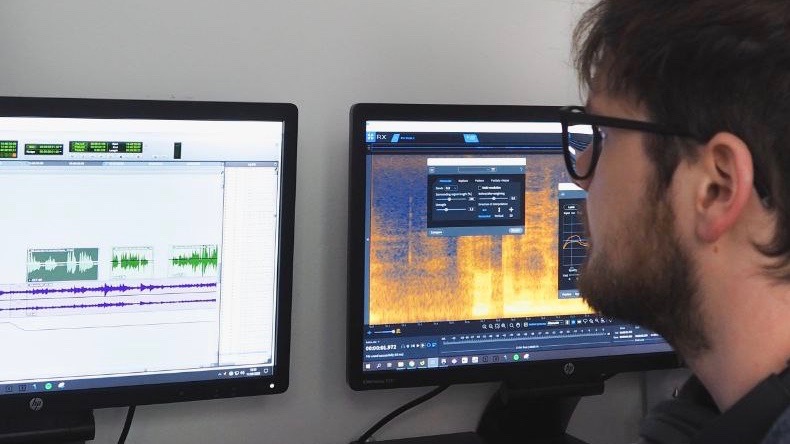After studying creative sound recording at Perth college focusing firstly on music, I began to take more of an interest in Film/TV sound and continued this career path to Abertay University in Dundee. It was there that I developed interests in studying film sound and gained lots of hands on experience working with other students, helping with all kinds of sound duties: music composition, boom operating, sound design and mixing – even the odd cameo as “boom operator #1”.
Nearly 4 years on, I am now a dubbing mixer at Arteus, with a range of different TV and film credits under my belt and an evolving workload of various projects at Arteus. I really enjoy the varied work we get, from observational documentaries, animations, documentary films, podcast recordings, voiceover and ADR sessions. Working closely with the bookings, online and machine room departments day-to-today really makes a difference and I believe that the team spirit really encourages professionalism and spurs us all on.
Obviously, things are a bit different just now… The current situation initially created a lot of doubt and uncertainty, particularly with the realities of dubbing TV programmes. When lockdown arrived we were able to bring an entire dubbing set up to my flat and I was up and running in no time, the main challenge was just not having an isolated and noise free environment. To try and compensate for this, luckily, I have a pair of noise-cancelling headphones to partially eliminate exterior noises. This method works surprisingly well, as the noise-cancelling technology really helps to get rid of the hums and general noise of a Glasgow flat and nearby whirring equipment etc. I also use a modest pair of speakers to mix on, as not only are they a nice break from wearing headphones all day, this can give you a more accurate perspective of a mix. The only thing that is done a little differently is checking the mixes more often than usual, listening via different sources, to check the perspective of a mix and ensuring the same quality as in a dubbing suite.
Not being in direct contact with the other departments is of course not ideal and could have made certain tasks a little cumbersome or taking a little longer, but thanks to the great relationship and communication we have as a team and a wonderfully put together file and server and sharing system (see “Secret Life of an Engineer in Lockdown” post), the workflow has been working incredibly well, supported by just a few members of staff doing essential things in the office.
Not unlike GFX, it is sometimes hard to demonstrate what a dub can do to a programme. The way in which it can improve the overall intelligibility of the dialogue, adding or improving certain elements implemented at the offline stage, can sometimes go unnoticed, which is in odd way is desired. The subtle trick seems to be dubbing without the viewer noticing its process and having “bad sound” stick out. Balance is paramount. Chipping away too much on a certain tricky piece of dialogue, or over track-laying a sequence only for it be on screen for a couple of seconds and not even being noticed - or oppositely, sticking out like a sore thumb - is all part of the huge learning curve at Arteus to date.
Being able to achieve the same results in the current WFH conditions is a satisfying achievement and a testament to what people, working together in a team, can achieve in such a crisis.
